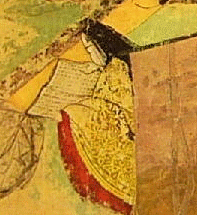
Ian Buruma, The Sensualist - What makes The Tale of Genji so seductive
Article paru sur le site du "New Yorker" le 20 juillet 2015.
"Much of “The Tale of Genji,” the eleventh-century Japanese masterpiece often called the world’s first novel, is about the art of seduction. Not that any sexual act is ever mentioned; very little in Murasaki Shikibu’s prose is plainly stated. Things are suggested, alluded to, often nebulously. What counts in the seduction scenes is the art, the poetry. Quite literally so: the proper approach to a desired lady was through poems, written on scented paper of the finest quality, delivered by an elegantly dressed go-between of appropriate social rank. More poems would be exchanged as soon as the approach bore fruit. (...)
Little wonder that even emperors were not always sure who their real fathers were. This was a particular sore point in the militantly imperialist nineteen-thirties, when the novelist Junichiro Tanizaki wrote a modern Japanese translation of “Genji.” As a result, he excised references to an emperor who was thought to be in the direct imperial bloodline but was actually the product of Genji’s illicit affair with his father’s mistress. (...)
A literal translation of “Genji” would be unreadable. And the vagueness, so poetic in Japanese, would simply be unintelligible to the Western reader. The trick is to retain the flavor of Murasaki’s lyrical style while transmitting, with some degree of precision, what she meant to say. Since we often don’t really know what she meant, much has to be left to guesswork and interpretation. (...)
Her apparent death by drowning leaves both suitors in a flood of tears. (Men cry a lot in “Genji.”) But Ukifune doesn’t die. She is found by a group of pilgrims. Pretending to have forgotten her past, she takes her vows and turns her back on the fleeting world. In the last chapter, “Bridge of Dreams,” Kaoru, alerted to her reappearance, sends her beloved younger brother over with a message to persuade her to come back. She refuses. He suspects that another man might be hiding her.
This abrupt conclusion has prompted speculation that the book may not have been finished. Perhaps it wasn’t. Or perhaps the open ending suggests that life simply goes on, in endless cycles, as we keep struggling in vain to be free from the ephemeral pleasures and sorrows of our brief existence. The dreams alluded to in the title of the last chapter might refer to the art of fiction or to the illusory nature of human life. But “The Tale of Genji” lives on because of its author’s genius at making the illusion come fully alive."